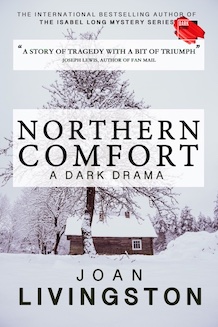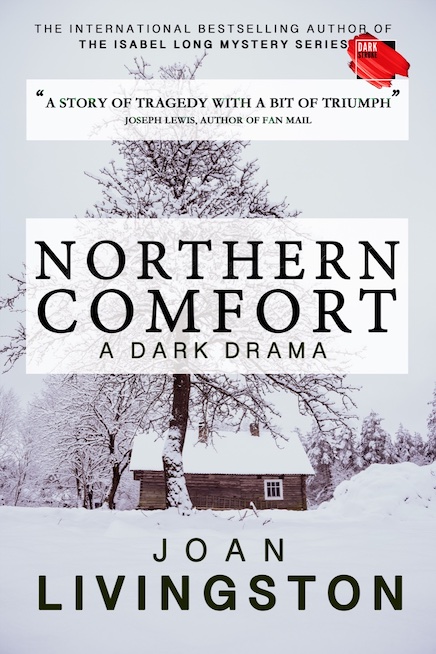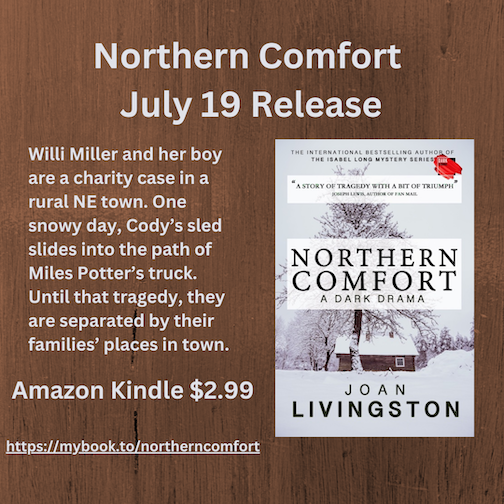My new book, Northern Comfort, starts with a tragedy — a child’s sled sends him into the path of a truck despite his mother’s attempts to stop him. For this post, I wanted to write about the two men most impacted by this tragedy. One is Miles Potter, who was driving the truck. The other is Junior Miller, who abandoned little Cody and his mother, Willi Miller.
Both men are natives in the hilltown of Hayward, but their backgrounds are so different. The same is true for the lives they lead. Let me explain.
Miles Potter could be described as a man of means and opportunity. His educated parents had high hopes for him, but college didn’t work out. When he returned home, he found work with a carpenter, Linwood Staples, who became his mentor. Working with his hands was more to his liking. Now on his own, he usually works on high-end homes. He and Willi may have been in the same class in school, but until this accident she was just another person living in the same town.
Junior Miller’s divorced parents had no ambitions for him. He loved Willi enough to marry her, but after their boy was born brain-damaged, he didn’t put any effort into their homelife. Then after he left Willi, he didn’t bother paying any child support after the first year or even be a part of his child’s life. When the book starts, Junior has a rather aimless life, driving truck for a lumberyard and crashing at his current girlfriend’s mobile home in New Hampshire.
But all of this changes that wintry day.
At the start, Miles does the right thing, leaving money for Willi and going to Cody’s funeral. But after Linwood advised him to think deeper, Miles tries to give more meaningful support. Eventually, he finds he and Willi have more in common than just this tragic accident.
Junior has a bigger challenge because of the longtime neglect of his responsibilities. His ideas of reparation at the start have little meaning to Willi, not surprising given the lousy role model his own father provided. It takes him longer to face his failings and make amends that have meaning to Willi.
These are two of the characters in Northern Comfort. As I do for all my novels, I create characters that feel real to me. I hope that’s true for you.
In this scene, Miles and Junior have a confrontation at the Bull’s Eye, the local watering hole. Junior is there with his brother, Mike.
Miles lurched forward as a hand slapped him on the back so hard his chest hit the edge of the Pine Tree’s bar.
A man’s voice said, “Hey, there, buddy, how you doin’?”
He looked into the face of Junior, who took the stool beside his. Junior’s brother Mike sat on the other side, grinning like he’d won big at cards and couldn’t wait to tell somebody. Both were high or drunk or both.
Now was the reckoning, and Miles was unsure how to proceed. It didn’t matter what he said or did, he was going to get it. Mike was heavier than Miles. He carried the weight of someone who liked booze and greasy food. Junior was short and always trying to make up for it.
Miles put down his bottle. He ran his tongue around the inside of his mouth. He wasn’t fooled.
Mike’s friendly comment was definitely fake. But Junior? Yeah, he, too, but he’d cut him a break.
“I’m sorry, Junior, about what happened to Cody.”
Junior fingered the front of Miles’s shirt. “You mean hitting him with your truck?”
“That’s not the way it happened. I tried to save him.”
Junior glanced toward Mike. “That so?”
Miles nodded solemnly, but Junior snorted. “I know what you’re thinkin’, Miles. I’ve got brass balls pickin’ on you ’cause I didn’t give more to that boy or Willi. He was my blood, and I loved his mother when he was born.” Junior brought his face closer and gave Miles’s shirt a tight twist. “And another thing. I don’t want you bothering Willi no more. She’s been through enough.”
“Get your hands off me, Junior.” His voice stayed calm, although his heart had a steady pound. “If you wanna keep this going, let’s take it outside. What’s it gonna be? The both of you?”
Junior loosened his fingers.
Miles stared at one brother, then the other. When Mike made a snorting laugh, Miles gave him a quick, light shot on the shoulder. Both brothers got to their feet. He stood, too.
“I’m gonna say it again, asshole,” Junior said. “Stay away from Willi.”
Miles drew his eyes tight. “Don’t tell me what to do.”
“You’ll listen to me if you know what’s good for you,” Junior said before he and his brother moved to another part of the bar.
Miles drank face forward. He focused on the mirror behind the three shelves of booze. Junior and Mike sat far from the mirror’s reach, but by now he didn’t care. The two brothers wouldn’t be back. They had made their point.
He finished the beer, and although he would have liked another, he fished for a buck in the front pocket of his jeans and flattened it on the bar’s top. He made a slow but straight path to the door.
Curious? Here’s the link for Northern Comfort.



